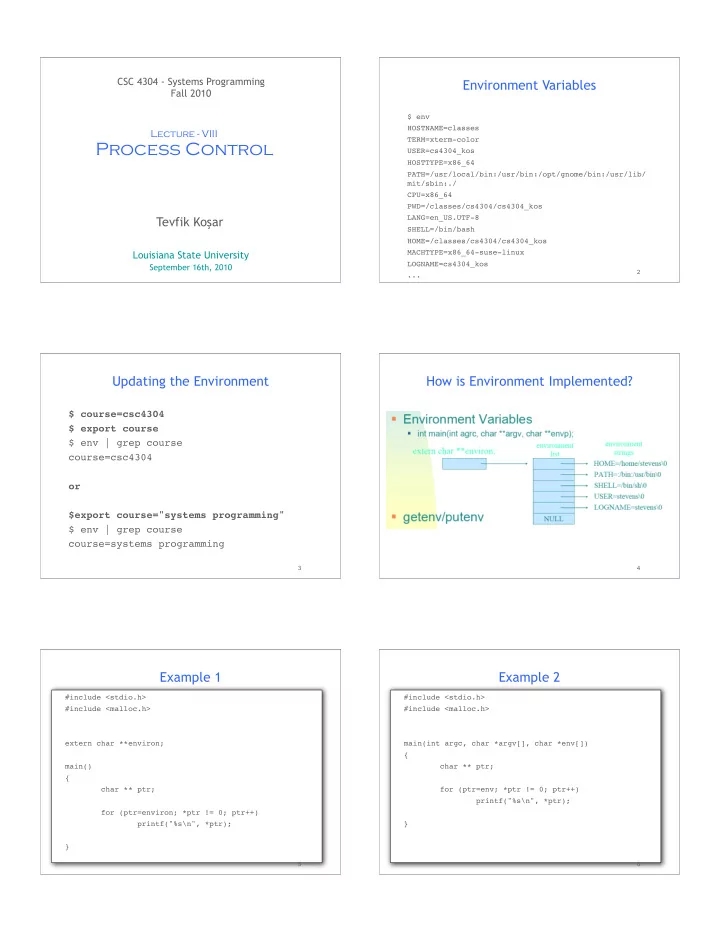

CSC 4304 - Systems Programming Environment Variables Fall 2010 $ env HOSTNAME=classes Lecture - VIII TERM=xterm-color Process Control USER=cs4304_kos HOSTTYPE=x86_64 PATH=/usr/local/bin:/usr/bin:/opt/gnome/bin:/usr/lib/ mit/sbin:./ CPU=x86_64 PWD=/classes/cs4304/cs4304_kos Tevfik Ko � ar LANG=en_US.UTF-8 SHELL=/bin/bash HOME=/classes/cs4304/cs4304_kos Louisiana State University MACHTYPE=x86_64-suse-linux LOGNAME=cs4304_kos September 16th, 2010 1 2 ... Updating the Environment How is Environment Implemented? $ course=csc4304 $ export course $ env | grep course course=csc4304 or $export course="systems programming" $ env | grep course course=systems programming 3 4 Example 1 Example 2 #include <stdio.h> #include <stdio.h> #include <malloc.h> #include <malloc.h> extern char **environ; main(int argc, char *argv[], char *env[]) { main() char ** ptr; { char ** ptr; for (ptr=env; *ptr != 0; ptr++) printf("%s\n", *ptr); for (ptr=environ; *ptr != 0; ptr++) printf("%s\n", *ptr); } } 5 6
system function Example 3 #include <stdio.h> #include <unistd.h> int system(const char *command); extern char **environ; main() { • used to execute command strings char *newenv[5]; printf("The current environment is..\n"); • e.g. system(“date > file”); system("env"); • implemented using fork(), exec(), and waitpid() printf("***** Now Replacing Environment...\n"); getchar(); newenv[0] = "HOME=/on/the/range"; newenv[1] = "LOGNAME=nobody"; newenv[2] = "PATH=.:/bin:/usr/bin"; newenv[3] = "DAY=Wednesday"; newenv[4] = 0 ; environ = newenv; execlp("env", "env", NULL); } 7 8 Getting Environment Vars Setting Environment Vars char * getenv(const char *name); int putenv(const char *name); //name=value int setenv(const char *name, const char *value, int rw); void unsetenv(condt char *name); #include <stdio.h> #include <stdlib.h> #include <stdio.h> #include <stdlib.h> main() { main() printf("SHELL = %s\n", getenv("SHELL")); { printf("HOST = %s\n", getenv("HOST")); setenv("HOST", "new host name", 1); } printf("HOST = %s\n", getenv("HOST")); } 9 10 vfork function fork example main() pid_t vfork(void); { int ret, glob=10; • Similar to fork, but: printf("glob before fork: %d\n", glob); – child shares all memory with parent ret = fork(); – parent is suspended until the child makes an exit or exec call if (ret == 0) { glob++; printf("child: glob after fork: %d\n", glob) ; exit(0); } if (ret > 0) { if (waitpid(ret, NULL, 0) != ret) printf("Wait error!\n"); printf("parent: glob after fork: %d\n", glob) ; } 11 12
vfork example Race Conditions main() static void charatatime(char *str) { { int ret, glob=10; char *ptr; int c; printf("glob before fork: %d\n", glob); setbuf(stdout, NULL); ret = vfork(); for (ptr=str;c=*ptr++;) putc(c,stdout); } if (ret == 0) { main() glob++; { printf("child: glob after fork: %d\n", glob) ; pid_t pid; exit(0); } if ((pid = fork())<0) printf("fork error!\n"); else if (pid ==0) charatatime("12345678901234567890\n"); if (ret > 0) { else charatatime("abcdefghijklmnopqrstuvwxyz\n"); //if (waitpid(ret, NULL, 0) != ret) printf("Wait error!\n"); } printf("parent: glob after fork: %d\n", glob) ; } 13 14 Output Avoid Race Conditions static void charatatime(char *str) { $ fork3 char *ptr; int c; 12345678901234567890 abcdefghijklmnopqrstuvwxyz setbuf(stdout, NULL); for (ptr=str;c=*ptr++;) putc(c,stdout); } $ fork3 main() { 12a3bc4d5e6f78901g23hi4567jk890 pid_t pid; lmnopqrstuvwxyz TELL_WAIT(); if ((pid = fork())<0) printf("fork error!\n"); else if (pid ==0) {WAIT_PARENT(); charatatime("12345678901234567890\n");} else {charatatime("abcdefghijklmnopqrstuvwxyz\n"); TELL_CHILD();} } 15 16 Process Accounting Process Accounting • Kernel writes an accounting record each time a process • Data required for accounting record is kept in the terminates process table • acct struct defined in <sys/acct.h> • Initialized when a new process is created – (e.g. after fork) • Written into the accounting file (binary) when the process terminates – in the order of termination • No records for – crashed processes – abnormal terminated processes 17 18
Pipes Process Communication via Pipes • one-way data channel in the kernel int pipe(int filedes[2]); • has a reading end and a writing end • pipe creates a pair of file descriptors, pointing to a pipe inode, and places them in the array pointed to by • e.g. who | sort or ps | grep ssh filedes. filedes[0] is for reading filedes[1] is for writing 19 20 main(int ac, char *av[]) { int thepipe[2], newfd, pid;*/ /* if ( ac != 3 ){fprintf(stderr, "usage: pipe cmd1 cmd2\n");exit(1);} * child will write into writing end of pipe */ if (pipe(thepipe) == -1){perror( "cannot create pipe"); exit(1); } close(thepipe[0]); /* close reading end */ close(1); /* will write into pipe */ if ((pid = fork()) == -1){fprintf(stderr,"cannot fork\n"); exit(1);} newfd=dup(thepipe[1]); /* so duplicate writing end */ if ( newfd != 1 ){ /* if not the new stdout.. */ /* fprintf(stderr,"Dupe failed on writing end\n"); * parent will read from reading end of pipe exit(1); */ } close(thepipe[1]); /* stdout is duped, close pipe */ if ( pid > 0 ){ /* the child will be av[2] */ execlp( av[1], av[1], NULL); close(thepipe[1]); /* close writing end */ exit(1); /* oops */ close(0); /* will read from pipe */ } newfd=dup(thepipe[0]); /* so duplicate the reading end */ if ( newfd != 0 ){ /* if not the new stdin.. */ fprintf(stderr,"Dupe failed on reading end\n"); exit(1); } close(thepipe[0]); /* stdin is duped, close pipe */ execlp( av[2], av[2], NULL); exit(1); /* oops */ } 21 22 Summary Acknowledgments • Advanced Programming in the Unix Environment by R. • Process Control Hmm. Stevens – Environment . • The C Programming Language by B. Kernighan and D. – Process Accounting Ritchie – Pipes • Understanding Unix/Linux Programming by B. Molay • Lecture notes from B. Molay (Harvard), T . Kuo (UT- Austin), G. Pierre (Vrije), M. Matthews (SC), and B. • Next Class: Signals Knicki (WPI). 23 24
Recommend
More recommend